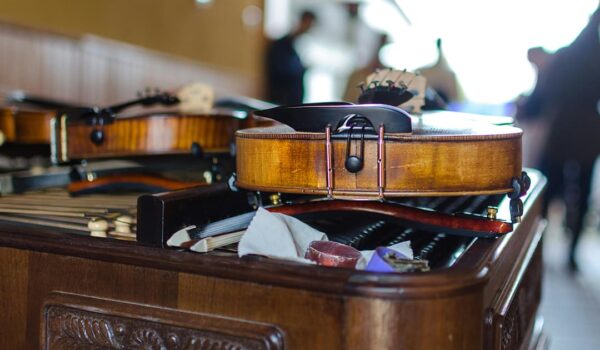When Paloke Kurti (1860-1920) composed “The Unity of Albania March” in 1878, Albania had yet to develop a tradition of classical or professional music. Kurti, a self-taught musician from Shkodra in northern Albania, was primarily involved in popular music. However, the early 20th century saw the first strides towards professionalism in Albanian music, led by the Franciscan priest Padre Martin Gjoka (1890-1940). Gjoka is considered the first Albanian composer to create classical music across multiple genres, drawing inspiration from the works of Bach and Handel. He wrote polyphonic and choral compositions, as well as an unfinished symphony, while also demonstrating a deep interest in traditional Albanian folk music, particularly from the mountainous regions, which were less influenced by Eastern musical traditions. Unfortunately, the lack of musical institutions and formal education systems meant that Gjoka’s works were performed mainly by amateurs and heard only by small, private audiences.
Despite these limitations, Gjoka and other musicians of his era helped establish Shkodra as a key center of musical life in Albania, particularly between the two World Wars and after WWII. Shkodra was the birthplace of Albania’s first orchestral and choral groups, and the staging of the country’s earliest musicals. This musical tradition eventually spread to the southern city of Korça. As a result, Shkodra became the educational hub for the first generation of Albanian composers in the latter half of the 20th century.
Preng Jakova (1917-1969), who studied clarinet at the prestigious Santa Cecilia Conservatory in Rome, was one of the most influential composers of this period. Jakova specialized in vocal music, and with operas like “Mrika” (1958) and “Scanderbeg” (1968), he became known as the creator of Albanian national opera. His works were influenced by the 19th-century Italian bel canto tradition, and he skillfully incorporated the melodies and rhythms of Albanian folk music into his compositions.
Among Albanian composers, none has had a greater impact than Çesk Zadeja (1927-1997), often hailed as the father of Albanian classical music. Born and raised in Shkodra, Zadeja studied composition at the Moscow Conservatory and, from 1956 onward, was a key figure in the development of Albania’s musical culture. He played an instrumental role in founding the Music Conservatory of Tirana, the Theatre of Opera and Ballet, and the Assembly of Songs and Dances. Zadeja also taught music composition at the Academy of Arts in Tirana for 30 years, where he educated a generation of prominent Albanian composers. His body of work, including his first symphony composed in 1956, two ballets, numerous concertos, symphonic works, chamber music, and vocal pieces, was characterized by technical precision and a deep integration of Albanian folk music elements.
The second half of the 20th century posed significant challenges for Albanian music due to the absence of a strong professional tradition. As a result, much of the country’s musical development remained rooted in classical and romantic styles. This era produced many notable composers, including Tish Daia (b. 1926), who composed Albania’s first ballet, “Halili and Hajria”; Nikolla Zoraqi (1928-1991), who worked on opera and ballet compositions; and Feim Ibrahimi (1935-1997), whose piano concertos contributed significantly to the development of Albanian musical theater in the 1970s and 1980s. Other important figures from this period include Tonin Harapi (1925-1991), a pioneer in Albanian piano education, as well as Shpetim Kushta (b. 1943) and Thoma Gaqi (b. 1949).
With the fall of communism in 1990, Albanian music entered a new phase of development. The end of state control and ideological restrictions allowed for the creation of new musical structures. Two key organizations, “The Society of Music Professionals” and “The Society of New Albanian Music,” were established between 1991 and 1992, providing a platform for Albanian musicians to integrate into the international music scene. These organizations also facilitated the emergence of new festivals and concerts, including the annual Festivals of New Music and International Chamber Music concerts, which continue to showcase contemporary Albanian music.
Today, Albanian composers like Aleksander Peçi (b. 1951), Sokol Shupo (b. 1954), Vasil Tole (b. 1963), and Endri Sina (b. 1968) represent the ongoing evolution of Albania’s classical music tradition. They continue to blend traditional Albanian elements with modern compositional techniques, ensuring that the country’s musical legacy remains vibrant and dynamic in the 21st century.

